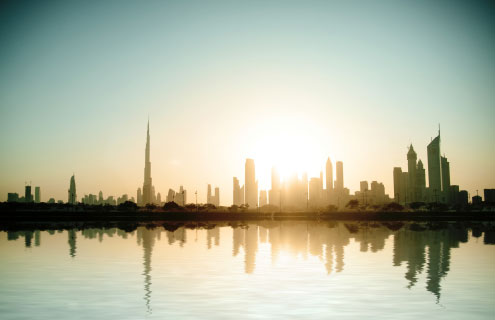Dubai
17 September 2014
Adding to the growth of the sukuk bond, Dubai’s new qualified investor fund aims to put the emirate on the domicile map for the Middle East and beyond
 Image: Shutterstock
Image: Shutterstock
As New York is for the US and Hong Kong is for the Asia Pacific, Dubai has become the financial capital of the Middle East. In the last 10 years, despite the hiccup of the last financial crisis, growth in the financial sector has been phenomenal. So much so that, in Emirates Investment Bank’s 2014 Gulf Corporation Council (GCC) Insight Report, 28 percent of global investors said they preferred the United Arab Emirates (UAE) as their destination for investment, above China, Europe (both 21 percent) and the US (at 17 percent).
Created in 2004, the Dubai International Financial Centre (DIFC) enables access for onshore and offshore clients to the region’s $5.7 trillion in nominal gross domestic product. In August 2014, a new set of amendments to the DIFC regulatory law proposed by the DIFC’s regulator, Dubai Financial Services Authority (DFSA), paved way for the introduction of a new alternative investment fund.
Ali Hassan, senior representative for Europe and North America at the DIFC, explains that the qualified investor fund is an alternative investment fund for the wealthy investor. The fund has a minimum subscription of $500,000 and must have 50 or fewer investors offered by private placement. He says: “The product is focused at that market … as investor of that type is likely to have the resources to conduct due diligence and look after themselves. The regulatory requirements imposed by the DFSA are briefer, tailored to reflect the underlying characteristics of the investor.”
Nadi Bargouti, managing director of asset management at Emirates Investment Bank, agrees that the tailored regulations are attractive to the qualified investor customer. He says: “High net worth individuals in the GCC have a tendency towards investing in dedicated, tailored strategies according to their investment needs.”
With the qualified investor fund not subject to requirements that apply to other types of funds available in the DIFC, it is an attractive prospect for investors not looking to reach the mass market. Hassan says: “Some of the requirements that are being imposed in Europe may not necessarily be relevant where, for example, you have a Middle Eastern investor and a non-EU manager, why over lay that with additional regulation?”
“The qualified investor fund is ideal for alternative investments such as private equity funds, which are naturally going to have a select number of investors. Because of that, the regulatory requirements are paired back, the costs and the settlement is lower, and the time to market is quicker.”
The DIFC offers a unique combination of sound regulation and laws in line with other onshore jurisdictions and favourable commercial aspects typically found in offshore jurisdictions, such as 0 percent tax and full ownership capabilities. By offering this solution and cutting out the middleman of an offshore domicile, says Hassan, the qualified investor fund strengthens Dubai and the DIFC as a domicile of choice for Middle Eastern investors.
“The new regulations are more accommodating and enable the DIFC to be increasingly competitive on a global scale,” says Bargouti. “As a Dubai-based private bank providing access to a wide range of local, regional and global investment solutions, we welcome this new initiative … as a positive step towards encouraging fund managers to consider launching new funds in the DIFC, which will increase the depth of the financial centre and make it a serious contender to its global peers.”
On the other end of the scale is the notable expansion of the sukuk bond. According to Nasdaq Dubai, the city is the third largest venue for sukuk listings by value, and in June 2014 Saudi Arabia’s Dar Al Arkan Estate Development Company added three listings from its sukuk programme on Nasdaq Dubai, with a total value of $1.15 billion. Minister of State for Cabinet Affairs of UAE and chairman of the board of the Dubai Islamic Economy Development Centre, Mohammed Abdulla Al Gergawi, said: “These listings by a major company within the GCC represents a further step in Dubai’s growth as the global capital of the Islamic economy.”
Further to the bond’s expansion, in July 2014, the UK became the first nation outside of the Middle East to settle the sukuk bond. Through Euroclear UK and Ireland (EUI), at a value of approximately £200 million, the bond is primarily issued in Brussels with settlement taking place at EUI and its sister international depository, Euroclear Bank. John Trundle, CEO of EUI, said: “Euroclear Bank has a strong history of providing post-trade expertise in sharia compliant debt—last year Euroclear Bank partnered with Borse Dubai to support asset servicing for our clients purchasing bonds on Nasdaq Dubai’s Sukuk trading platform.”
“EUI already holds £1.3 trillion worth of gilts on behalf of clients, and these clients have the choice of holding balances in these sukuks at EUI or Euroclear Bank.”
With the combination of the sukuk bond and the qualified investor fund, Dubai is hitting the right notes with its onshore customers while creating new opportunities for offshore investment that could make the emirate the go-to domicile in the Middle East.
Created in 2004, the Dubai International Financial Centre (DIFC) enables access for onshore and offshore clients to the region’s $5.7 trillion in nominal gross domestic product. In August 2014, a new set of amendments to the DIFC regulatory law proposed by the DIFC’s regulator, Dubai Financial Services Authority (DFSA), paved way for the introduction of a new alternative investment fund.
Ali Hassan, senior representative for Europe and North America at the DIFC, explains that the qualified investor fund is an alternative investment fund for the wealthy investor. The fund has a minimum subscription of $500,000 and must have 50 or fewer investors offered by private placement. He says: “The product is focused at that market … as investor of that type is likely to have the resources to conduct due diligence and look after themselves. The regulatory requirements imposed by the DFSA are briefer, tailored to reflect the underlying characteristics of the investor.”
Nadi Bargouti, managing director of asset management at Emirates Investment Bank, agrees that the tailored regulations are attractive to the qualified investor customer. He says: “High net worth individuals in the GCC have a tendency towards investing in dedicated, tailored strategies according to their investment needs.”
With the qualified investor fund not subject to requirements that apply to other types of funds available in the DIFC, it is an attractive prospect for investors not looking to reach the mass market. Hassan says: “Some of the requirements that are being imposed in Europe may not necessarily be relevant where, for example, you have a Middle Eastern investor and a non-EU manager, why over lay that with additional regulation?”
“The qualified investor fund is ideal for alternative investments such as private equity funds, which are naturally going to have a select number of investors. Because of that, the regulatory requirements are paired back, the costs and the settlement is lower, and the time to market is quicker.”
The DIFC offers a unique combination of sound regulation and laws in line with other onshore jurisdictions and favourable commercial aspects typically found in offshore jurisdictions, such as 0 percent tax and full ownership capabilities. By offering this solution and cutting out the middleman of an offshore domicile, says Hassan, the qualified investor fund strengthens Dubai and the DIFC as a domicile of choice for Middle Eastern investors.
“The new regulations are more accommodating and enable the DIFC to be increasingly competitive on a global scale,” says Bargouti. “As a Dubai-based private bank providing access to a wide range of local, regional and global investment solutions, we welcome this new initiative … as a positive step towards encouraging fund managers to consider launching new funds in the DIFC, which will increase the depth of the financial centre and make it a serious contender to its global peers.”
On the other end of the scale is the notable expansion of the sukuk bond. According to Nasdaq Dubai, the city is the third largest venue for sukuk listings by value, and in June 2014 Saudi Arabia’s Dar Al Arkan Estate Development Company added three listings from its sukuk programme on Nasdaq Dubai, with a total value of $1.15 billion. Minister of State for Cabinet Affairs of UAE and chairman of the board of the Dubai Islamic Economy Development Centre, Mohammed Abdulla Al Gergawi, said: “These listings by a major company within the GCC represents a further step in Dubai’s growth as the global capital of the Islamic economy.”
Further to the bond’s expansion, in July 2014, the UK became the first nation outside of the Middle East to settle the sukuk bond. Through Euroclear UK and Ireland (EUI), at a value of approximately £200 million, the bond is primarily issued in Brussels with settlement taking place at EUI and its sister international depository, Euroclear Bank. John Trundle, CEO of EUI, said: “Euroclear Bank has a strong history of providing post-trade expertise in sharia compliant debt—last year Euroclear Bank partnered with Borse Dubai to support asset servicing for our clients purchasing bonds on Nasdaq Dubai’s Sukuk trading platform.”
“EUI already holds £1.3 trillion worth of gilts on behalf of clients, and these clients have the choice of holding balances in these sukuks at EUI or Euroclear Bank.”
With the combination of the sukuk bond and the qualified investor fund, Dubai is hitting the right notes with its onshore customers while creating new opportunities for offshore investment that could make the emirate the go-to domicile in the Middle East.
NO FEE, NO RISK
100% ON RETURNS If you invest in only one asset servicing news source this year, make sure it is your free subscription to Asset Servicing Times
100% ON RETURNS If you invest in only one asset servicing news source this year, make sure it is your free subscription to Asset Servicing Times



